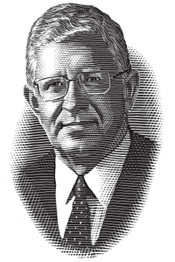|
||
      |
From the President: Lost in translation
Don Michael Randel on why the National Security Language Initiative is both good and bad news.

Secretary of State Condoleezza Rice and Secretary of Education Margaret Spellings invited 120 university presidents to Washington in January to attend the unveiling of the National Security Language Initiative (NSLI). The announcement itself was made by President Bush. Seated in the front row, in addition to Secretary Rice and Secretary Spellings, were Secretary of Defense Donald Rumsfeld and Director of National Intelligence John Negroponte. At dinner that night were the Secretary of Labor and the Secretary of Commerce. We were addressed at lunch the next day by the First Lady and by Ambassador Karen Hughes, the Undersecretary of State for Public Diplomacy. If you like organ music, you call this pulling out all the stops.
The Department of State’s Web site describes the NSLI as “a plan to further strengthen national security and prosperity in the 21st century through education, especially in developing foreign language skills. The NSLI will dramatically increase the number of Americans learning critical-need foreign languages such as Arabic, Chinese, Russian, Hindi, Farsi, and others through new and expanded programs from kindergarten through university and into the workforce. The President will request $114 million in FY07 to fund this effort.”
Anything that commits more resources to the study of foreign languages—especially if the study starts in kindergarten, when kids are actually very good at learning them—is to be applauded. It would be nice if we had thought of this sooner. It would be nicer still if we had always assumed that this is a good thing. But the context and some of the specifics of the initiative give rise to an uneasy feeling. It sounds a little bit as if there are bad people in the world, and we ought to have a better idea of what they are saying. At the briefings we were told that there would not be any funds in the new program for French or German or Italian or Spanish. Yet it might be argued that, if one is going to war, one should know not only the languages of one’s enemies but also the languages of people whom one might hope to have as allies.
The sad fact is that we invest seriously in our national intellectual life only when it can be justified in terms of the national defense. That is very nearly as true of science as it is of the study of other cultures and regions of the world, to say nothing of the humanities and the arts more generally. The exception is biomedicine, which we invest in for the sake of our own longevity, but without much attention to what makes life truly worth living in the first place.
Even from the narrow perspective of the national defense, however, we have such a tragically short attention span. If we wait until we know whom we are going to war against (whether militarily or economically), it is surely already too late to start the relevant language instruction. Many of us remember a moment at which it seemed terribly important to know more Vietnamese and other languages of Southeast Asia. We have largely forgotten about that imperative now. Simultaneously, the NSLI does not mention the languages of Indonesia, yet if we think it important to know about Muslims (whether for the right reasons or not), we ought to recognize that there are many more Muslims in Indonesia than in the Arabian Peninsula.
Why should I be writing about all of this in the University of Chicago Magazine? Because the President’s initiative and the assumptions behind it provide another example of the principle that I assert endlessly: The nation and the world need the University of Chicago now more than ever. We are an institution committed to the study of everything worth knowing and to the proposition that immediate practical concerns do not define what is worth knowing. We have a long tradition of studying the cultures of other parts of the world because those cultures are inherently worth knowing about, quite apart from the rather considerable utility of that knowledge. With recent appointments in the Divinity School in addition to long-standing strengths in history, political science, language teaching, and other fields, the University of Chicago is arguably the best place for the academic study of Islam and the cultures in which it is a dominant religion.
Such expertise is an intellectual asset of real power and importance for
the long term. Why should we invest in such an asset, along with other similar
assets that we could name? Not in the first instance because of the current
state of world affairs. In part, perhaps, we should make such an investment
because the future state of world affairs is unknowable. But the more important
answer to the question, Why invest?, is another question: If we care about
what it means to be a human being, how could we not?